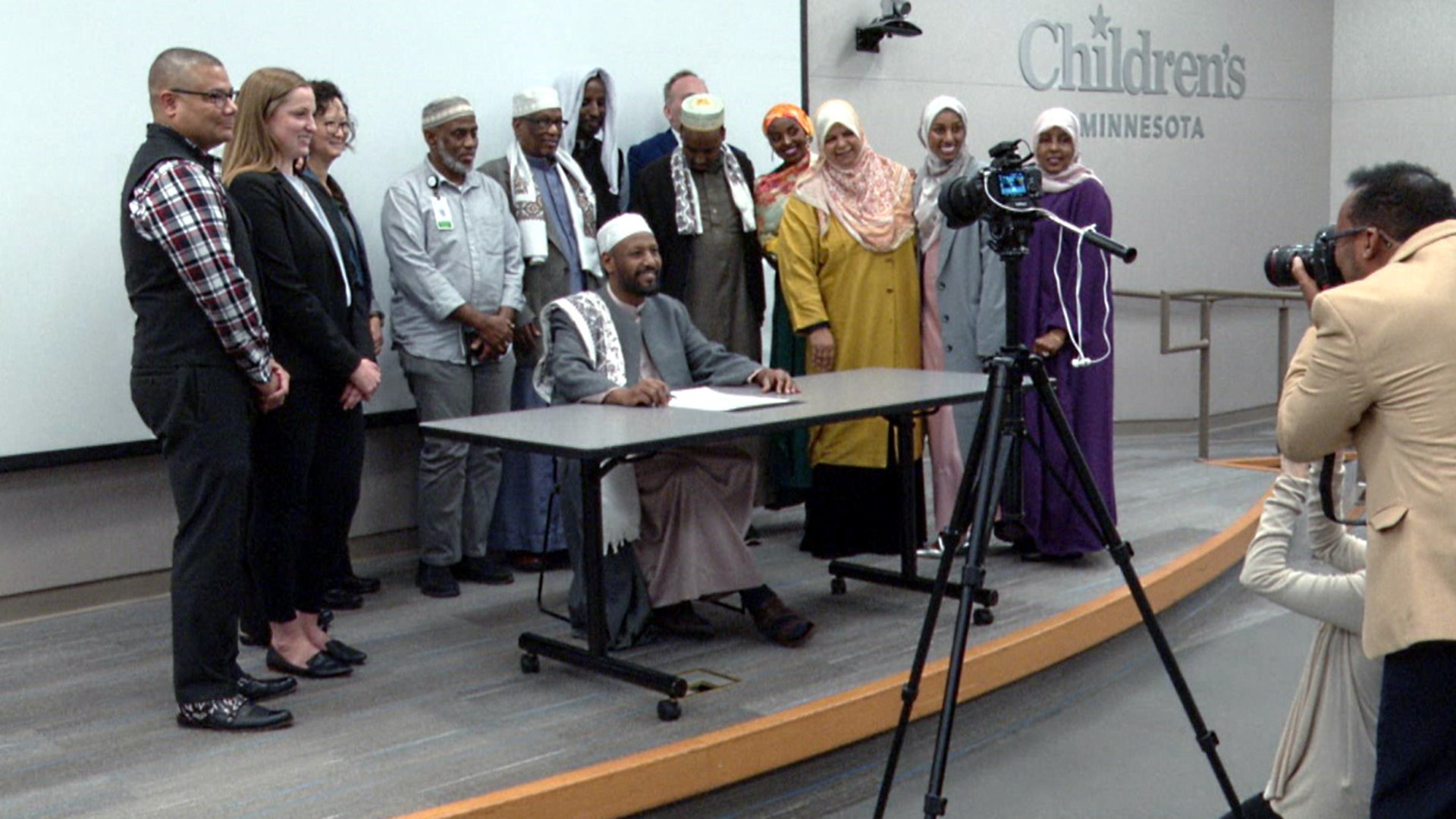MINNEAPOLIS — A new chapter in local medical history began Thursday at Children's Minnesota, one that could improve the lives of many children. It resolves an age-old dilemma for Muslim mothers who can't produce enough breast milk for their newborn babies struggling to grow.
Dr. Mohamed Mahad, an imam at Nurul-Iman mosque in Minneapolis, issued a fatwa that clears the way for Muslim mothers to feed pasteurized donated human breast milk to babies who are premature, ill or have a low birthweight.
"When Islamic law is unclear, Islamic scholars will gather to understand, discuss and issue a fatwa, or legal position on a topic," Dr. Mahad explained.
To read the fatwa click on this link.
Thursday's announcement was the culmination of months of discussions among health providers, milk banks, Muslim community members, experts and scholars. This fatwa is believed to be the first of its kind in the United States.
"It brings us great joy to learn that you sought out help to solve this problem by actively involving the communities in the decision-making process and jointly designing a solution with those who are most affected."
There are at least 140,000 Muslims in Minnesota and many believe that breastfeeding someone else's biological child creates a form of kinship with that child. According to Dr. Mahad, that creates the risk the child may someday unknowingly marry someone who nursed them or is related to them through breast milk kinship.
For medical professionals in Neonatal Intensive Care units, it has been heartbreaking at times that newborns can't take advantage of donated breast milk.
"These conversations in NICU often felt like an impasse," Dr. Leah Jordan, a neonatologist at Children's Minnesota, remarked at the fatwa-signing ceremony.
"We as the medical team felt strongly about the benefits of pasteurized donor human milk for protecting the life of an infant, and families felt uncertain about how to reconcile pasteurized donor human milk with the beliefs in their faith."
The fatwa will open the door for Muslim women who can't produce enough of their own breast milk to rely on the supply from a human breast milk bank.
"This fatwa removes barriers to accessing pasteurized donor human milk for vulnerable Muslim infants and is a monumental step toward increasing health equity in our community," Dr. Jordan said.
"We celebrate this ruling. The babies who will survive and thrive because of it. The families who will experience peace in their decision-making and the relationships we’ve formed in the process that will allow us to promote equitable health outcomes in our community."
Much of Thursday's gathering was devoted to extolling the benefits of human breast milk for developing babies, especially those who are ill or struggling to grow as newborns.
"It’s way beyond nutrition. It is a live, dynamic substance with unparalleled immunologic and anti-inflammatory properties," said Dr. Nancy Fahim, a neonatologist at M Health Fairview who also teaches neonatology at the University of Minnesota Medical School.
"Human milk saves lives. And when mom’s milk is not available, using pasteurized human milk helps protect these babies against significant infections."
WATCH MORE ON KARE 11+
Download the free KARE 11+ app for Roku, Fire TV, Apple TV and other smart TV platforms to watch more from KARE 11 anytime! The KARE 11+ app includes live streams of all of KARE 11's newscasts. You'll also find on-demand replays of newscasts; the latest from KARE 11 Investigates, Breaking the News and the Land of 10,000 Stories; exclusive programs like Verify and HeartThreads; and Minnesota sports talk from our partners at Locked On Minnesota.
- Add KARE 11+ on Roku here or by searching for KARE 11 in the Roku Channel Store.
- Add KARE 11+ on Fire TV here or by searching for KARE 11 in the Amazon App Store.
- Learn more about the KARE 11+ app for Apple TV in the Apple App Store.
- Learn more about KARE 11+ here.
Watch more local news:
Watch the latest local news from the Twin Cities and across Minnesota in our YouTube playlist:
Dr. Chip Martin-Chaffee, a neonatologist at CentraCare, amplified those remarks.
"There’s the bacteria actually in breast milk that can populate that sterile infant gut, allowing good, healthy bacteria to grow and foster in that gut, protecting them from getting bad bacteria overgrowth."
Dr. Martin-Chaffee was especially excited about the opportunity to save babies' lives in the Saint Cloud area, which also has a large Somali Muslim population. He cited research that shows breastfeeding also gives mothers better long-term health outcomes.
Linda Dech, executive director of the Minnesota Milk Bank for Babies, said most breast milk donations come from mothers who are expressing more milk than they need. She said all donors are carefully screened and the final pasteurized version is regulated by the State of Minnesota as a food product.
But cost and availability have been factors that exclude some families from being able to use those valuable resources. Removing a religious barrier, she said, will be significant in protecting more children.
"With this Fatwa, Muslim families with preemies in the NICU or sick babies in the hospital can have the same access to pasteurized donor milk as others do and help them get off to the best start possible."

